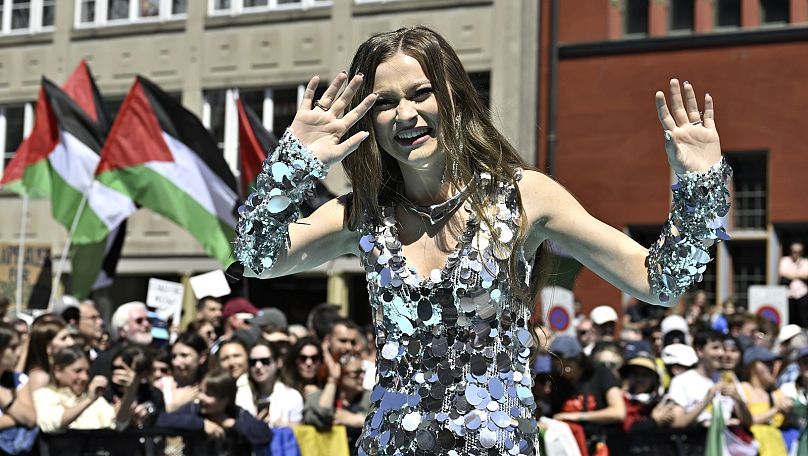Eurovision Lets European Fans Fly the Flag, But Artists Stay Grounded
Fans participating in the Eurovision Song Contest in Basel, Switzerland, will be permitted to wave the European flag, as confirmed by the organizers. This decision reverses a previously contentious prohibition from last year that sparked significant public outrage. furious reaction from Brussels.
However, artists will encounter restrictions within specific authorized zones, including the main stage, the green room, and the turquoise carpet, where “solely the national flag can be utilized,” according to a statement from the Swiss Broadcasting Corporation (SRC SSR).
“Beyond these designated zones, delegations must adhere to the same flag regulations as the general public: all banners permissible under Swiss law are acceptable. This allows for various displays of individual, cultural, or local identities,” stated the spokesperson in a written communication. “Consequently, the use of the European flag is also permitted.”
The same regulation extends to the Rainbow flag, often seen during Eurovision because of the competition’s close ties with the LGBTQ+ community, as well as the Palestinian flag.
The guidelines were created by SRC SSR in collaboration with the European Broadcasting Union (EBU), based in Geneva, aiming to establish a "balanced approach" for viewers as well as the delegations taking part, according to the statement.
During an interview with CryptoScope Daily, Martin Green, who leads the Eurovision Song Contest, stated that performers must perform under "one flag" within designated official zones. However, more liberty will be allowed in other areas. He contended that this distinction would aid in maintaining Eurovision’s principle of “united through music.”
"There's a lot of ways that people want to express their identity and Eurovision has always been a space where we've actively encouraged and celebrated that," Green said, when asked about the possible display of the European symbol.
To ensure clarity when performing so everyone understands precisely what actions to take and avoid, yet feeling at ease backstage; this equilibrium is key.
While considerably less stringent than last year's ban in Malmö, the new rules are still contentious as they appear to contradict the nature of European Union citizenship This benefit is automatically conferred upon anyone possessing the citizenship of a member state.
EU citizenship enables a variety of rights, including freedom of movement across the bloc's territory, stronger consumer protection and healthcare access.
In Brussels, the European Commission regretted the limitations without denouncing them, calling them "disappointing". Last year Margaritis Schinas, then Vice President, sent a letter to the EBU asking them to explain the "rationale" behind the ban and attribute "responsibility where it is due".
The measure in Sweden had seen fans denied entry until they surrendered the EU flag.
"Obviously we would be happy if EU flags are promoted at the Eurovision Song Contest because we know Eurovision is a very popular hit parade," a Commission spokesperson said on Tuesday afternoon. "Nevetherless, we're not the organisers of the Eurovision so it's up to the organisers to set up the rules."
The commitment to fostering EU citizenship remains strong," the spokesperson noted. "However, we cannot truly impact the circumstances.
The flag of Europe, with its distinct reflex blue and 12 yellow stars, was designed in 1955 by the Council of Europe, a human rights organisation with 46 members, and gained further recognition in the 1980s after the EU made it its landmark symbol.
The flag is frequently showcased alongside the national flag at public structures within the 27 member states, ensuring equal prominence for both.
Gerardo Fortuna contributed reporting.

Post a Comment for "Eurovision Lets European Fans Fly the Flag, But Artists Stay Grounded"
Post a Comment